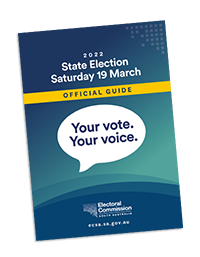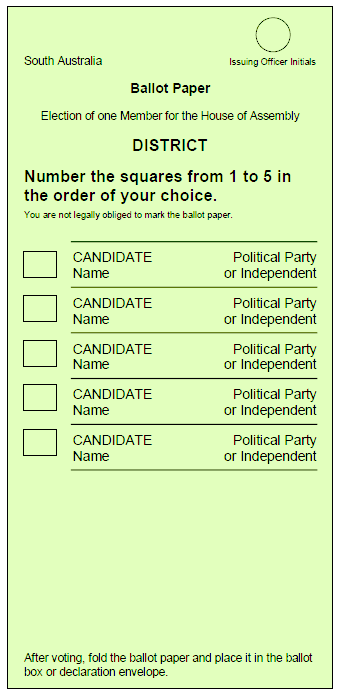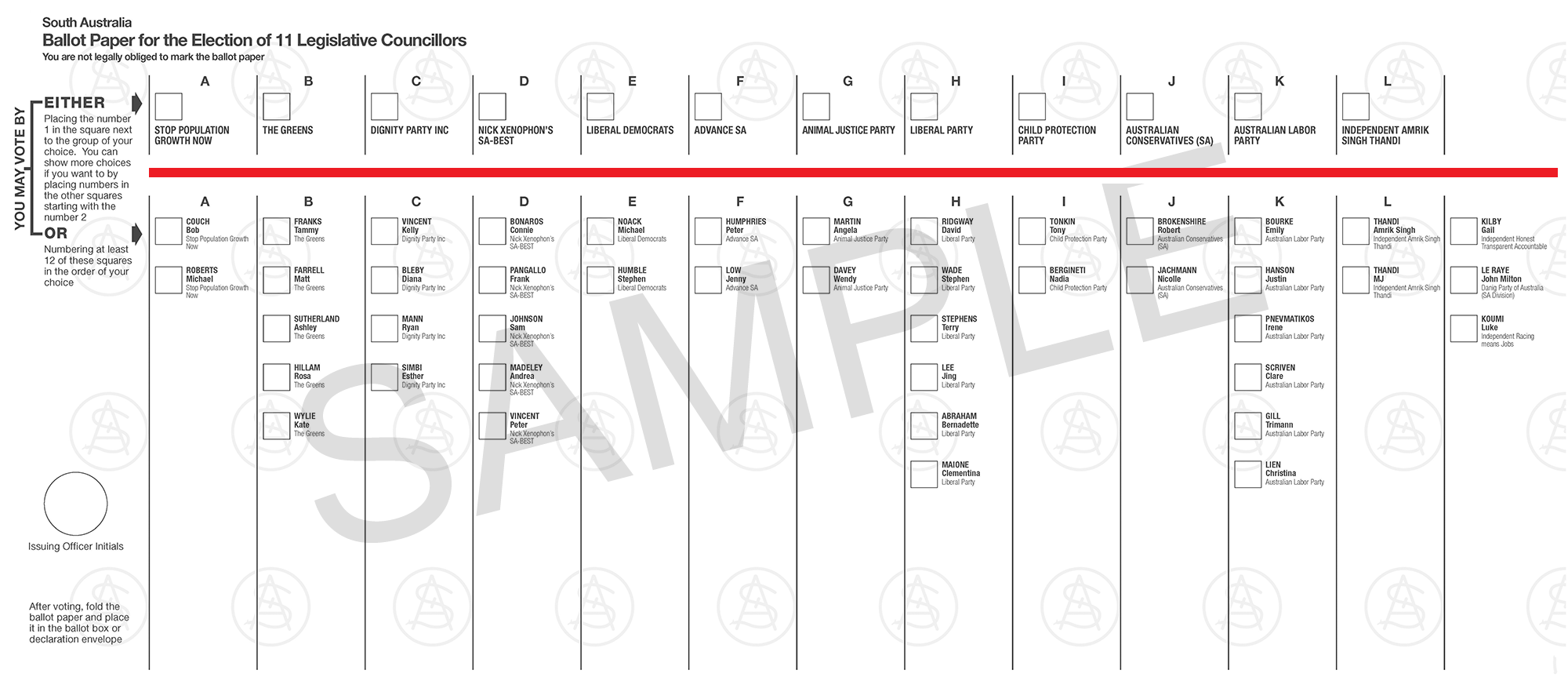Elections
- Details
- Category: Elections

Electoral communication is an important part of the election process, enabling voters to appropriately inform themselves ahead of casting their vote.
The 'check the source' campaign is aimed at raising awareness of the need to consider and review the source of electoral communication. This is so electors can avoid being misled by disinformation and can cast an informed vote at this state election.
What is electoral disinformation?
Electoral disinformation is information spread regarding the election, or election matters, intended to deceive voters. It may also be called ‘fake news’. Misinformation on the other hand may deceive voters unintentionally.
Disinformation can be disseminated via a range of communication channels but can be particularly prevalent online. Social media and online websites can be a quick and effective channel to spread electoral disinformation. It is therefore very important that you check the source and review whether it can be considered reliable, current and safe.
Checking the source
Is the source reliable?
If you are unsure about the source of the information you can ask:
- Is the information from a reliable and recognisable source?
- Has it come from an accredited media outlet or a verified social media account?
Is the source current?
When was the information published?
Check when the information was first published and the original source of that information. Something posted today is not necessarily current just because it was posted or shared today, it may have originally been created a long time ago and is no longer accurate.
Is the source safe?
If you are suspicious of the source or the content of information being communicated online, particularly via an unsolicited email or social media post, consider whether it is appropriate to be clicking any included link. It may be a scam.
Links
Social media companies have their own policies on content and the terms and conditions of use. Familiarising yourself with this information may also assist you in understanding how information is disseminated on social media.
- Details
- Category: Elections
Learn how to vote in the state election
Watch the following video that guides you on what to do when you go to vote. Remember, voting is compulsory.
 Download a copy of the 2022 State Election Guide (PDF, 1.3MB).
Download a copy of the 2022 State Election Guide (PDF, 1.3MB).
Also available in other languages on our state election guide page.
How to complete your ballot papers (including practice ballot papers)
When voting in the state election you will be given 2 ballot papers: a green paper for the House of Assembly and a white paper for the Legislative Council.
House of Assembly
On the green House of Assembly ballot paper you need to number every square in the order of your choice.
- Write the number 1 in the square next to the candidate who is your first choice
- Write the number 2 next to your second choice
- Continue by placing the numbers 3, 4, 5 and so on until you have a number in EVERYsquare.

If you need assistance or make a mistake please see an electoral officer.
You can practice making a formal vote by using our interactive ballot paper below:
House of Assembly practice ballot paper >>
Legislative Council
2022 State Election - sample LC ballot paper with candidates (PDF, 90KB)
To view the Legislative Council ballot paper, either download a copy via the following link or click on the picture to view in full screen mode.

On the white Legislative Council ballot paper there are 2 ways you can vote. Either above the red line or below the line - but not both.
Vote above the red line:
If you choose to vote above the red line:
- Write the number 1 in the square next to the party or group of candidates which is your first choice.
- You can then write the number 2 next to your second choice, and so on for as many parties or groups of candidates as you like. You do not need to number every square.
- Leave the rest of the ballot paper blank. Do not mark below the red line.
By voting above the red line, your vote will go to the candidates within the group (or groups) you have chosen.
Vote below the red line:
If you choose to vote below the red line:
- Write the number 1 in the square next to the candidate who is your first choice.
- Continue by placing the numbers 2, 3, 4, 5, 6 in the squares next to the other candidates of your choice until you have chosen a minimum of 12 candidates.
- You may choose to continue numbering more than 12 candidates.
By voting below the red line, you are deciding the order of candidates according to your preferences.

If you make a mistake, don't worry. Put a line through the mistake and write the correct information beside it, or you can ask an electoral officer for a replacement ballot paper.
You can practice making a formal vote by using our interactive ballot paper below:
- Details
- Category: Elections
|
Postal voting applications |
Open Monday 2 February 2026 |
State Election
If you’re unable to attend a voting centre in person, you can apply for a postal vote, if
- are more than 8 km from a polling booth
- are travelling
- are ill, infirm or disabled – preventing you from attending a polling booth
- are due to give birth shortly
- are caring for someone who is ill, infirm or disabled - preventing you from attending a polling booth
- have religious beliefs - preventing you from attending a polling booth
- are working and unable to leave your workplace to vote
- are a resident of a declared institution being a hospital, convalescent home, nursing home, home for the aged, hostel for the aged or infirm, prison or other places of confinement
- have your address suppressed on the electoral roll (a silent elector)
- are subject to a direction under the Emergency Management Act 2004 requiring you to quarantine or isolate during the hours of polling.
Permanent postal voter
ECSA maintains a register of voters who are permanently unable to attend a polling place during state elections or by-elections and who meet prescribed eligibility criteria. These individuals are classified as a 'Registered Declaration Voter' for state elections and as 'General Postal Voter' for federal elections. Once registered, ECSA automatically sends out voting packs for every state election or by-election. You do not need to re-apply for future elections.
To apply to become a registered declaration voter for a parliamentary election you must be enrolled and meet one of the following criteria that prevent you from attending a polling place on polling day:
- Distance – you are enrolled at an address more than 20 km away from any polling place
- Illness – you are a patient at a hospital or nursing home and unable to travel to a polling place
- Infirmity – you are unable to travel to a polling place due to being infirm or seriously ill at home
- Caring for others – caring for a person who is seriously ill or infirm
- Physical disability – you are unable to sign your name due to a physical incapacity
- Religion – your religious beliefs or membership of a religious order prevent you from attending a polling place
- Overseas – you are registered as an overseas elector
- Silent elector – you are an elector whose address has been suppressed
Apply to become a 'Registered Declaration Voter'
To join the register of permanent postal voters, you will need to complete and sign a form via the Australian Electoral Commission (AEC) website:
Registered postal voter information and application form
*This is an external link to the Australian Electoral Commission (AEC) which manages registrations for ECSA. One form allows you to register both as a registered declaration voter for South Australian elections and as a general postal voter for parliamentary elections. For any questions about the register, call the AEC on 13 23 26.
Local government election postal voting
Voting in council elections, including supplementary council elections, is conducted by post. All election materials, including your ballot papers, are automatically mailed directly to the postal address you provided on the electoral roll. It's important you keep your address details up to date.
Once nominations close for a council election (including a supplementary election), ballot papers are printed and postal ballot packs are sent to your nominated postal address. More information can be found on this website at the time of an election.
